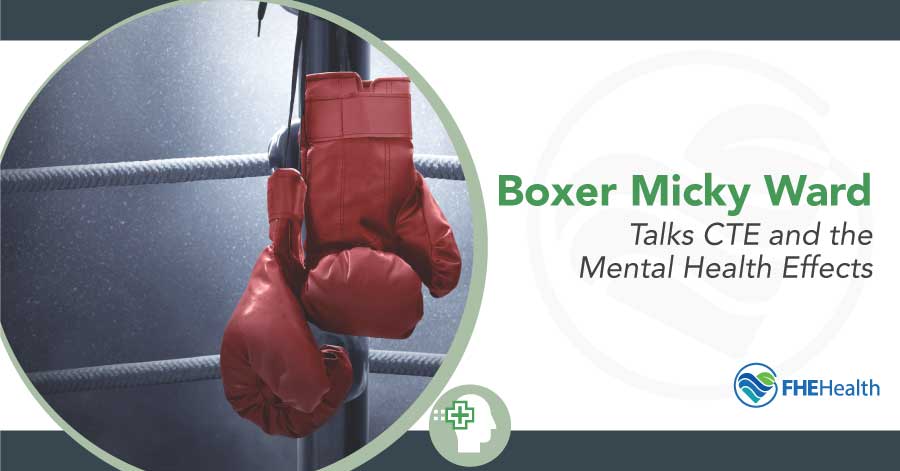
Boxer Micky Ward was as tough as they come. The pride of Lowell, Massachusetts, often referred to by his nickname “Irish,” was a one-time light welterweight boxing champion. Ward, now 56, was known for his “iron jaw” and his ability to remain standing even while absorbing punishing blows to his head and body. He is best remembered for his three brutal and dramatic fights with the late Arturo Gatti. His life as a boxer was made into a 2010 film, “The Fighter,” which starred Mark Wahlberg as Ward. The picture won two Academy Awards and was nominated for Best Picture.
Ward retired in 2003. However, two years later, he began to suffer symptoms of chronic traumatic encephalopathy or CTE. CTE, or chronic traumatic encephalopathy, is a degenerative brain disease caused by repeated brain trauma. It’s common among boxers, football players, military veterans, soccer players, and others with a history of concussions or other brain trauma.
“It’s terrible,” Ward told the Boston Herald in 2020. “It makes you nauseous, it’s like a thump in the back of my head. You just feel drained all day.”
Ward told The Ring the same year that these headaches wake him up in the middle of the night. Although he uses over-the-counter medications to combat the pain, “Nothing takes it away completely.”
Is CTE a Mental Illness?
While CTE certainly has an impact on physical health, many people wonder about its effect on mental health. Aside from causing physical symptoms like headaches, memory loss, and impulsivity, it can also have mental illness effects like depression, dementia, rage, anxiety, and panic attacks.
It can lead sufferers to contemplate suicide. Junior Seau, star linebacker for the former San Diego Chargers and the New England Patriots, committed suicide in 2012 after long bouts of suffering from CTE. He was only 43.
Boxers Diagnosed with CTE
Boxers have a long history of dealing with CTE. In Britain, 17% of boxers between the years 1930 and 1950 showed clinical evidence of having CTE. Studies linking boxing and CTE were published as early as 1928. Nearly 90% of modern boxers suffer some form of traumatic brain injury during their careers, according to a 2013 study by the Association of Neurological Surgeons. One of the doctors associated with the study described it as “like having whiplash on a daily basis.”
CTE has also become a common problem in professional football and has led the NFL to try to create safer and better helmets. New rule changes now penalize players who use their heads and helmets when making a tackle. The NFL is also making monetary and medical efforts to help former players deal with the mental health impacts of CTE.
While some complain that these changes have made football less exciting to watch, they’ve improved the safety and health of athletes who play the game. These changes have also been mirrored in nonprofessional levels of the game, such as college and high school.
Boxing is also making efforts to deal with CTE side effects. Studies show that one of the best ways to reduce brain trauma in boxing is by wearing a helmet. Amateur boxers are required to do this, but professional boxing remains a holdout.
However, part of the issue dealing with the effects of CTE is that both boxing and football can provide very lucrative paydays. Many athletes don’t consider the long-term effects of repeated blows to the head while enjoying the celebrity and wealth that come with success in these sports.
Micky Ward Today
These days, Micky Ward continues to manage a boxing gym in his hometown of Lowell. In 2012, he released an autobiography, A Warrior’s Heart, where he disclosed for the first time that he was sexually abused between the ages of nine and 12. He says one of his goals in releasing the book is that if he can help even one person, telling his life story will have been worth it.
He also works for the Concussion Legacy Foundation, an organization that strives to create smarter sports and safer athletes. Ward has agreed to donate his brain and spinal column to the CTE Center at Boston University after his death. He is also currently part of a long-term study at the center looking into behavioral and cognitive issues around CTE.
Ward, who began his boxing career at age 7, now advocates that parents wait until their children are at least 14 before they enroll them in football or boxing.
In 2020, he teamed up with Super Bowl champions Randy Cross, former San Francisco 49er, and Leonard Marshall, former New York Giant, to promote a PSA that encouraged parents not to allow their kids to play tackle football until they’re 14.
“If one of the mothers or fathers could get inside my head for a day and know what my head feels like from taking so many blows in boxing, they would think twice about letting their kids get hit under 14 years old,” Ward says.
Help for CTE
Currently, there’s no cure for CTE. However, the symptoms of CTE can be managed with special therapies, memory exercises, and pain management. Celebrities like Ward, Cross, and Marshall have a positive impact on individuals who may have CTE and are looking for a way to deal with the symptoms. They can also help parents protect their children in the long term.
If you’ve been involved with a sport like boxing or football, or you’re a military veteran who served in a location where repeated brain trauma was a regular occurrence, you may be struggling with real mental illness. You can reach out for help. When you contact us by calling (833) 596-3502, you’ll be working with our compassionate team of counselors whose main goal will be to help you find ways to deal with the effects of CTE. Call us today and start your journey to recovery.






